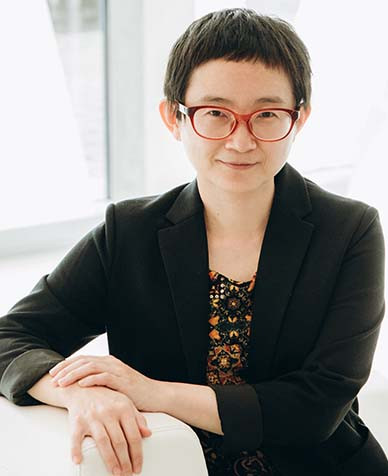
Zhange NI
Religion and Culture, Virginia Tech, United States of America
Fellowship : October 2021 to June 2022
Discipline(s) : Religion
Area(s) of expertise : Culture
Pays : United States of America
Research project: The Cult of Fiction in the Age of the Internet: Chinese Religion, Online Fantasy, and Adventures beyond Global Capitalism.
In this project, Zhange Ni studies fantasy novels published on the Internet in 21st century China. She defines Fantasy as a branch of fantasy literature that reinvents magic, superstition, that is, "false" or "irrational" ideas and practices rooted in popular traditions around the world that oppose modern science and the liberal model of religion through a form of internalized, privatized and depoliticized piety. Following the translation of contemporary Western discourses on science, religion and superstition, Chinese Fantasy first appeared in the form of martial arts fiction in the early twentieth century. The very anti-superstitious nation-state subsequently suppressed it. In the late 20th and early 21st centuries, Chinese Fantasy has come into its own with the revival of Chinese religions, including what was previously considered superstition and new media such as films, television, video games, and the Internet. In the vast ocean of fantasy novels, she distinguishes three sub-genres to conduct a text analysis - xiuzhen (the quest for immortality), daomu (tomb raiding) and danmei (homoerotic romances). She argues that they engage with the messy reality of contemporary China and demonstrate the post-socialist generation’s desire to navigate the labyrinth of global capitalism and seek alternative imaginaries beyond the dominant order.
Biography
Zhange Ni received her Ph.D. in Religion and Literature from the University Of Chicago Divinity School (2009), and worked as a research associate and visiting assistant professor at the “Women’s Studies in Religion” Program at Harvard Divinity School (2010-2011). She is currently an associate professor at the Department of Religion and Culture, Virginia Tech. Her first book The Pagan Writes Back: When World Religion Meets World Literature (2015) proposes “pagan criticism,” a new reading strategy that attends to the historical complexities and contingencies in literary texts and challenges both Christian and secularist assumptions regarding aesthetics and hermeneutics. She has written articles on secularism and religion-making in twentieth-century China on the one hand, religion and contemporary popular literature in the Euro-American West on the other. At IAS-Nantes, she will draft her second book manuscript The Cult of Fiction in the Age of the Internet: Chinese Religion, Online Fantasy, and Adventures beyond Global Capitalism. In addition, Ni is a writer of creative works in China, having published three books of poetry, three essay collections, and one novel.
Bibliographie
(Books, Journal Articles, Book Chapters)
The Cult of Fiction in the Age of the Internet: Chinese Religion, Online Fantasy, and Adventures beyond Global Capitalism (Research project proposed for IAS-Nantes)
Chapters in progress
• “Steampunk, Zombie Apocalypse, and Homoerotic Romance: Rewriting Revolution Plus Love in Contemporary China,” submitted to Modern Chinese Literature and Culture (December 2018), reviewers’ comments received (March 2019), to be resubmitted (May 2019).
• “Immortality Cultivation: Daoist Alchemy, Transhumanist Technology, and Fiction beyond Neoliberalism,” to be submitted to Zygnon: A Journal of Religion and Science (June 2019).
Related Publications
• Religion and the Arts in The Hunger Games (A reference article to be published by Brill Research Perspectives in Religion and the Arts as a small monograph, about 35000-word).
• “A New Defense of Poetry According to Ally Condie’s Matched Series.” Journal of Popular Culture 50.1 (2017): 163-183. (Writing Sample)
• “Postsecular Reading,” in Susan M. Felch, ed., Cambridge Companion to Literature and Religion (New York: Cambridge University Press, 2016), 51-67.
The Thorny Paths of Chinese Secularism (book manuscript to be completed in 2020)
Book Chapters Published Elsewhere
• “Salomé Kisses Kuṇāla’s Eyes: New Woman, Religion-Making, and Varieties of Literature in Republican China.” Comparative Literature Studies 56.1 (2019): 31-58. (Writing Sample)
• “Making Religion, Making the New Woman: Reading Su Xuelin’s Autobiographical Novel Jixin (Thorny Heart),” in Ping Yao, Jinghua Jia, and Xiaofei Kang, eds., Gendering Chinese Religions (New York: SUNY Press, 2014), 71-99.
Related Publications
• “Nation, Religion, and Su Xuelin’s World-Building Project,” submitted to The Frontiers of Literary Studies in China, accepted (pending revisions, Feb 2019).
• “Xinwenxue, guozu goujian, yu xingbie chayi” (New Literature, Nation Building, and Gender Difference), Zhongguo xiandai wenxue yanjiu congkan (Modern Chinese Literature Studies) 6 (2011): 21-33. (Written in Chinese and published in a peer-reviewed journal in China)
• “Rewriting Jesus in Republican China: Religion, Literature, and Cultural Nationalism,” The Journal of Religion 91. 2 (2011): 223-252.
The Pagan Writes Back: When World Religion Meets World Literature (Charlottesville: University of Virginia Press, 2015). Finalist for the 2016 AAR Book Award in Textual Studies.
Book Chapters Published Elsewhere
• “Strange Paradise: Wrestling with the Golem and Double Idolatry in Cynthia Ozick’s Puttermesser Papers,” Literature and Theology 29.1 (2015): 66-85.
• “Japan’s Orient and Animal Theology in Shūsaku Endō’s Deep River,” The Journal of American Academy of Religion 81.3 (2013): 669-697.
Reprinted in Darren Middleton and Mark Dennis ed., Navigating Deep River: New Perspectives on Shusaku Endo’s Final Novel, State University Press of New York, forthcoming in 2019.
Book Reviews
Review of Christopher Douglas, If God Meant to Interfere: American Literature and the Rise of the Christian Right (New York: Cornell University Press, 2016), Relegere: Studies in Religion and Reception 7.1-2 (2018): 181-184.
Review of Saba Mahmood, Religious Difference in a Secular Age: A Minority Report (Princeton, NJ: Princeton University Press, 2016), The Journal of Religion 98. 2 (2018): 284-286.
Review of Maya Barzilai, Golem: Modern Wars and Their Monsters (New York University Press: New York, 2016), Religion 48.1 (2018): 178-181.
Review of Ronald Grimes, The Craft of Ritual Studies (Oxford University Press, New York, 2014), The Journal of Religion 96. 3 (2016): 402-403.
Review of Jimmy Yu, Sanctity and Self-Inflicted Violence in Chinese Religions, 1500-1700 (Oxford University Press, 2012), Religion 44. 4 (2014): 689-692.
Review of Daniel H. Bays, A New History of Christianity in China (Wiley-Blackwell, 2011), Frontiers of History in China 7. 2 (2012): 310-2.
Review of Rebecca Nedostup, Superstitious Regimes: Religion and the Politics of Chinese Modernity (Harvard University Press, 2010), Frontiers of History in China 6. 1 (2011): 156-159.
Review of David J. Leigh, S.J., Apocalyptic Patterns in Twentieth Century Fiction (University of Notre Dame Press, 2008), The Journal of Religion 90.2 (2010): 279-281.
Review of Jeana DelRosso, Writing Catholic Women: Contemporary International Girlhood Narratives (Palgrave Macmillan, 2005), The Journal of Religion 87.2 (2007): 323–324.
Other Scholarly Publications
“A Response to David Jasper’s ‘Academic Adventures in China,’” Christianity and Literature 62, no.4 (2013): 593-597.
“The Thorny Paths of Su Xuelin,” Harvard Divinity Bulletin 39, no.3-4 (2011): 50-57.
Response to Jacqueline Bussie, “Flowers in the Dark: African American Consciousness, Laughter, and Resistance in Toni Morrison’s Beloved,” The Religion & Culture Web Forum of the University of Chicago Divinity School, July 2009.
FELLOW FOCUS
Zhange Ni’s residency seminar was held on Monday, April 11, 2022: Chinese Religions, Digital Capitalism, and Internet Fantasy Novels in Contemporary China
Internet-based popular fiction emerged in China around the turn of the 21st century and is currently dominated by the genre of fantasy. Produced and consumed in a digital environment, these novels fuse ancient techniques (such as Daoist alchemy and fengshui divination) and contemporary bio-digital technologies to build other-worlds and alternative subjects beyond the confines of post-Enlightenment rationality. Their magical worlds are modeled after both the qi cosmos of premodern China and the world as reimagined in the processes of datafication and financialization. Both worldviews privilege a correlative mode of thinking that looks for relations and patterns amongst things/processes. These novels are concerned with the making of the individual as well as the dividual—a more foundational element of agency and transaction than the individual, or a formation produced by dividual actions and transactions, one that is larger or smaller than the individual. Telling stories of the self-motivated, self-enterprising individual in competition with others, these novels also depart from this model to imagine the subject as a fluid construct, with body, mind, and their fragments flowing regardless the contours of the individual. Like correlation, dividuation is both rooted in premodern Chinese notions of the self and performed by technologically-assisted transfigurations of the individual in the digital age. In this light, internet-based fantasy novels serve as one channel among many others through which Chinese religions, not excluding ideas and practices negatively labelled “superstitious,” continue to make an impact on today’s society. They also register the still on-going structural transformations unleashed by the permeation of digital technologies in everyday life. A site of digital labor for hundreds of millions of writers and readers, these novels are not only targets of capitalist capture and state censorship but also a field of thought experimentation where utopian imaginaries are not impossible.
Her suggestions for the week:
Film: The Wandering Earth (2019), a Chinese science fiction film
Book: Grandmaster of Demonic Cultivation - Mo Dao Zu Shi (Novel) Vol. 1, by Mo Xiang Tong Xiu
This is a Chinese fantasy novel available in English translation. Even more interestingly, it is a hybrid of cultivation fantasy and male-male romance. The author served 3 years in prison because publishing homoerotic novels for profit was considered illegal business operation.
Image:

